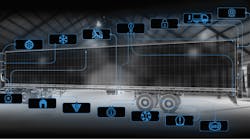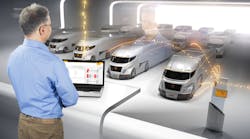The term “smart trailer” has been a popular topic in the trucking industry that has continued to gain momentum over the last couple of years. The developments in this category have evolved due to the ability to track and obtain ever-increasing amounts of data from the trailer. Gerry Mead, executive director of innovation for Phillips Industries, talks more about the evolution of the “smart trailer” systems, and how it can benefit fleets.
Transcription of interview:
David Brierley, Fleet Maintenance: Welcome to VSP News: Uptime Update. I am your host David Brierley, managing editor of Fleet Maintenance magazine, covering all maintenance, all vehicle classes, all management, all the time.
I’m filling in for Erica Schueller while she’s out on assignment this week.
The term “smart trailer” has been a popular topic in the trucking industry that has continued to gain momentum over the last couple of years. The developments in this category have evolved due to the ability to track and obtain ever-increasing amounts of data from the trailer.
We talked with Gerry Mead, executive director of innovation for Phillips Industries. The company has been at the forefront of connected vehicle technology and has focused efforts on telematics through a division called Phillips Connected Technologies.
One aspect of connected vehicles has been the Internet of Things, or I-o-T. IoT refers to the interconnection of multiple computing devices that collect and share data with one another on a network – whether that be smart phones, computers, vehicles, or even household appliances. Mead discussed the current state of IoT as it relates our lives in general, and more specifically, the trucking industry.
Gerry Mead, Phillips Industries: IoT has really changed a lot of everything. If you think about the basis of the internet, back when we had that noise from the connectivity, from AOL online (the modem dialing in on a phone line) on our Compact 64, to where we’re at today with carrying a simple device called a [smartphone], connected.
What IoT has done is really allowed us several other efficiencies we can drive into our business (for the trucking industry), especially as it relates to the maintenance side. When you think about looking at different aspects that are out there – from your desk, from a computer, without actually touching that unit, and seeing what’s coming in, now you’re receiving data without actually (physically) looking at the unit. That allows that new level of connectivity, or “hand shake” to build efficiencies around that and better our maintenance programs as a whole.
Brierley, Fleet Maintenance: The industry has been familiar with "smart" trucks for some time, and the use of sensors to assist with monitoring vehicle location, as well as vehicle performance and systems. Mead talks more about how sensors on “smart” trailers have become more prevalent in the industry.
Mead, Phillips Industries: Smart trailers bring sensorization, which is a collection of all the data that’s coming off the sensors (on the trailer) into one central hub. Basically, we’re taking that “dumb” box (the trailer) that would sit in the corner, and we’re putting intelligence on it, so it an communicate to us directly.
When you think about what all those sensors bring to the market, they bring a treasure chest of information back to you, so fleets can solve their issues from a maintenance standpoint. Today, most trailers are fixed on a time-based schedule. All these sensors will move fleets from a fix-as-fail based program to a fix-as-prescribed program or predictive maintenance program, moving from an unscheduled to scheduled program.
These smart systems will bring you V2V (vehicle to vehicle) and V2I (vehicle to infrastructure) communication standards, and allow that vehicle, as it couples with that smart truck, to build one complete smart system, which is the road to autonomous trucks.
Brierley, Fleet Maintenance: How do these systems have the ability to talk with one another? Mead shares more.
Mead, Phillips Industries: Systems talk using an application program interface, or API. With our system you can connect via API in a cloud environment. We (Phillips Connected Technologies) use (the cloud-based system) Convex. In order for the system to work, you must have that information from the fleet system – be it an operations system, or CMMS (computerized maintenance management system) – to combine that data coming off of that trailer.
That “hand shake,” or the API integration within those two systems will then combine to the data needed to make that “smart” environment occur. The best way to do that is through an application program interface.
Brierley, Fleet Maintenance: Mead talks more about what trends we might expect in the future, as it relates to trailer connectivity.
Mead, Phillips Industries: You know when you talk about “smart” systems in general, and you look at where our industry is going, it’s a lot about smart cities. You hear a lot about V2V – vehicle-to-vehicle communications – or V2I – vehicle-to-infrastructure communications – really you need a complete coupled vehicle to do that (e.g. a smart tractor and smart trailer).
When you think about trends in the future, to get to a fully autonomous vehicle, that tractor that pulls that box needs to understand a lot of information that the driver would have – as simple as a tire getting low or a brake out of adjustment. All of those (vehicle systems) need to be sensed.
Where I see the future going is, as sensors continue to develop, people are going to start to leverage an understanding and learn what they bring back to the business.
One of the statements I like to use is “today when we all make an order from a company, we expect that order in two to three days. Tomorrow, our kids and grandkids, when they make that same order, they’re going to expect that order in minutes. Without connected technologies and the development of technologies that we continue to leverage IoT, utilizing digitization and sensorization within our industry, we won’t be able to get there.
You’ll see continued involvement of these sensors and these systems that are going to change our industry like never before.
Brierley, Fleet Maintenance: Interested to read more about the “smart” trailers, and trailer connectivity? Then check out the link below.
Thank you for tuning in to VSP News Uptime Update, I’m your host David Brierley.
Until our next broadcast, keep up with this, and other industry topics, by visiting us online at VehicleServicePros.com.



